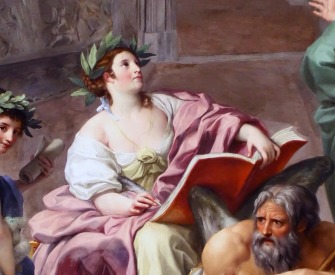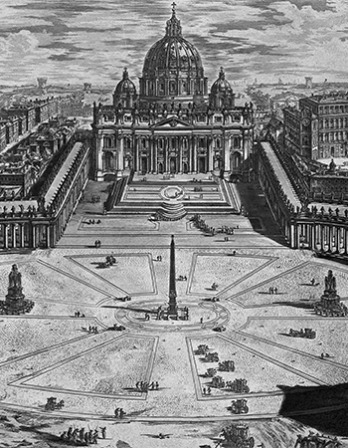Amusing Remark by a Young Woman in Labor
In Florence, a young woman, somewhat of a simpleton, was on the point of being delivered. She had long been enduring acute pain, and the midwife, candle in hand, inspected her private parts, in order to ascertain if the child was coming. “Look also on the other side,” said the poor creature. “My husband has sometimes taken that road.”
A Doltish Venetian Made a Fool of by an Itinerant Quack
We laughed heartily at a story Giannino told us. He related that an itinerant quack came to Venice, on whose sign was pictured a Priapus divided at certain intervals by band strings. A certain Venetian came up and inquired the meaning of those partitions. The quack, for the fun of the thing, replied that his member was endowed with such a peculiar property, that if, with a woman, he used but the first part, he begot merchants; if the second, soldiers; up to the third, generals; up to the fourth, popes—his fee being proportionate to the rank and quality ordered. The dolt took his word for it and, after a conference with his wife, brought him to his house and bargained for a soldier. As soon as the quack had set about the job, the husband made a pretense of withdrawing, but hid himself behind the bed: when he saw the pair hard at work manufacturing the agreed-upon soldier, he rushed forward, giving the man’s backside a vigorous push, so as to secure the advantage even of the fourth division. “By God’s holy gospel,” he shouted. “This will be a pope!” fancying he had diddled the fellow.
A Mountaineer Who Thought of Marrying a Girl
A mountaineer, of the village of Pergola, was inclined to marry the quite youthful daughter of one of his neighbors, but after close inspection he found her too young, too delicate, and refused. “She is riper than you think,” said the stupid father, “for she has already had three children by the vicar’s clerk.”
Conclusion
I think I should not omit to mention the place where most of the above tales were related, I might almost say, acted. That place is our Bugiale, a sort of laboratory for fibs, which the pope’s secretaries had formerly instituted for their amusement. Until the reign of Pope Martin we were wont to select, within the precincts of the court, a secluded room where we collected the news of the day, and conversed on various subjects, mostly with a view to relaxation, but sometimes also with serious intent. There nobody was spared, and whatever met with our disapprobation was freely censured; oftentimes the pope himself was the first subject matter of our criticism, so that many people attended our parties, lest they should themselves be the objects of our first chapter. Foremost among the relaters were Razello of Bologna, many of whose contributions are found in our tales; Antonio Lusco, a most witty man, whom we have frequently referred to; and the Roman Cincio, who was also very fond of a joke; I have also added some good things of my own. Now that those boon companions have departed this life, the Bugiale has come to an end: whether men or the times are to be held responsible, it is a fact that genial talk and merry confabulation have gone out of fashion.
From Jocose Tales. During his fifty years serving as secretary to eight successive popes, Bracciolini hunted for manuscripts in European monasteries: in one he discovered Quintilian’s Institutes of Oratory—tucked away in a place “into which one would not cast a criminal condemned to death”—and in another Lucretius’ On the Nature of Things. Both books had been thought to be lost for hundreds of years. He wrote to a fellow scholar and copyist in 1429, “You have now kept the Lucretius for twelve years…and the Petronius Arbiter for seven or more; it seems to me that your tomb will be finished sooner than your books will be copied.”
Back to Issue





